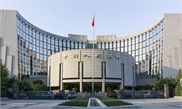
File photo: VCG
China's financial regulators will ramp up the implementation of the financial stability law, an institutional guarantee of increased capabilities in averting systemic risks, Lu Lei, deputy head of the State Administration of Foreign Exchange (SAFE), China's forex regulator, said at a key forum on Saturday.Lu made the remarks via video while releasing an annual report on China's financial policy at the 2022 Tsinghua PBCSF Global Finance Forum in Beijing, which focused on the country's financial risk prevention knowhow amid multifaceted uncertainties.
Earlier this month, China's central bank unveiled a draft financial stability legislation, including the creation of a financial stability guarantee fund, laying the legal groundwork for a holistic, sector-spanning and cross-departmental approach to prevent systemic financial risks.
To ensure the smooth and sound operation of the financial system, financial authorities need to speed up the implementation of the financial stability law, Lu said.
The law will be a key measure for China to establish a long-term mechanism for maintaining financial stability, and a solid institutional guarantee for preventing major financial risks and improving the ability to control systemic financial risks, he continued.
With geopolitical conflicts intensifying and the COVID-19 epidemic continuing, the implementation of the financial stability law is a measure to stabilize the market, providing top-level, comprehensive and coordinated legal support for various financial sectors, Dong Dengxin, director of the Finance and Securities Institute at the Wuhan University of Science and Technology, told the Global Times on Sunday.
With the growth of China's capital market, the nation needs to establish a financial stability guarantee fund. Similar financial tools have long been used in mature markets of other countries to deal with unexpected risks or huge market fluctuations, Dong added.
Speaking of external shockwaves and risks, Guan Tao, global chief economist at BOC International, said at the forum that other than the US Federal Reserve's monetary tightening, geopolitical risks are also worth noting.
The Russia-Ukraine conflict will have a raft of direct and indirect implications, "and even the indirect implications would far outstrip the direct impact," Guan said, calling for efforts to strengthen risk prevention in the sphere of foreign exchange while stabilizing market expectations.
Guan said that the trend-bucking strength of the Chinese yuan reflects the fundamentals of the Chinese economy underpinned by resilient industrial and supply chains.
The yuan's exchange rate index rallied 8 percent last year, according to the China Foreign Exchange Trade System. The annual growth rate was the highest on record, according to Guan.
Global Times


